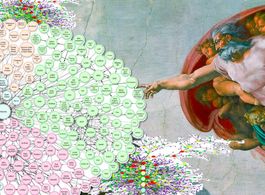Looking for courses...
Current courses
Enter short description
- Mar 2, 2023 - Apr 3, 2026
- Record of Achievement
- en
Self-paced courses
Book a certificate to enable proctoring for exams - you will obtain a special certificate that highlights / proves which person took the exams in this course.
- Self-paced since May 31, 2023
- Certificate / ECTS
- en
Testing out the new Content A/B Test feature before using it in a real course.
- Self-paced since Mar 9, 2023
- Record of Achievement
- de
Lorem Ipsum Test
- Self-paced since Dec 1, 2022
- Certificate / ECTS
- en
Archived course with 2 quizzes
- Self-paced since Dec 1, 2022
- Certificate / ECTS
- en
Aus unserem täglichen Leben ist das Internet nicht mehr wegzudenken. Wir nutzen das World Wide Web, um an Informationen zu gelangen, tauschen uns über soziale Netzwerke wie Facebook und Twitter aus, nutzen E-Mail und greifen auch innerhalb eines Unternehmens, in abgeschirmten Intranets auf die Internettechnologien zu. In diesem Kurs lernen Sie, auf welchen technologischen Grundlagen das weltumspannende Internet arbeitet. Dabei werden zuerst die Funktionsprinzipien und Technologien der lokalen Netzwerke (LANs) und der Weitverkehrsnetzwerke (WANs) erläutert. Anschließend werden das dem Internet zugrunde liegende TCP/IP-Referenzmodell sowie dessen Protokolle und zahlreichen Anwendungen allgemeinverständlich dargestellt. Der Teilnehmer gewinnt in diesem Kurs einen tiefgehenden Einblick in die komplexe Welt der Internet-Technologien.
- Self-paced since Aug 3, 2022
- Certificate / ECTS
- de
- de, fr
The knowledge contained in the World Wide Web is available in interlinked documents written in natural language. To make use of this knowledge, technologies such as natural language processing, information retrieval, data and knowledge mining must be applied. Semantic Web technologies follow an alternative approach by complementing web documents with explicit semantics based on formal knowledge representations, such as e.g. ontologies. In this MOOC, you will learn the fundamentals of Semantic Web technologies and how they are applied for knowledge representation in the World Wide Web. You will learn how to represent knowledge with ontologies and how to access and benefit from semantic data on the Web. Furthermore, you will also learn how to make use of Linked Data and the Web of Data, currently the most popular applications based on Semantic Web technologies.
- Self-paced since Feb 26, 2018
- Certificate / ECTS
- en
- ar, en, zh
In diesem kostenlosen offenen Online-Kurs führen wir Sie in das aktuelle und viel diskutierte Thema Big Data Analytics ein. Der sechswöchige Kurs wird Ihnen verständlich machen, warum Daten der Schatz des 21. Jahrhunderts sind und wie man diesen heben kann. Ob Finanzdienstleister, produzierende Unternehmen, Internet-Dienstleister oder Forschungszentren: In Wirtschaft und Wissenschaft wächst das Interesse, in dem gewaltig anschwellenden Meer an erhobenen und anfallenden Daten diejenigen herauszufischen, die es auf interessante Zusammenhänge hin zu analysieren sowie vernünftig zu strukturieren und zu verknüpfen gilt. So können schneller bessere Erkenntnisse gewonnen, Entscheidungen getroffen und Prognosen erstellt werden. Das Meer an Daten führt dann zu einem Mehr an Wissen!
Im Kurs erfahren Sie, wie bei der Auswertung riesiger Datenmengen sinnvoll vorzugehen ist - angefangen bei modernsten Data Mining-Techniken zum "Schürfen" bislang verborgener oder ungenutzter Informationen über die Aufbereitung bis hin zur Analyse der Daten. Aktuelle Anwendungen und einprägsame Praxisbeispiele machen Sie mit den grundsätzlichen Problemstellungen vertraut. Welche verschiedenen Algorithmen bei der Lösung helfen können, wird ebenfalls diskutiert. Schließlich stellen wir Ihnen noch gängige Methoden vor, mit denen Sie in die Lage versetzt werden, Data-Mining-Lösungen für konkrete Anwendungen zu bewerten.
- Self-paced since Dec 18, 2017
- Certificate / ECTS
- de
In this 2 week workshop we discuss the emergence of social media, how the concept gained popularity and has now become the axle in collaborative communication on the Internet. We follow this with a presentation of basic approaches that you can use to protect your data and more importantly your privacy on these platforms. Everyone knows the odd feeling of discomfort when having added someone you actually don't know very well to yours friends' list or to the wrong category within your contacts. The participants will learn in this openHPI course that privacy is still a concern also for users who do not actively use the Internet.
- Self-paced since Nov 6, 2017
- Record of Achievement
- en
The „In-Memory Data Management" MOOC in 2017 is the fifth iteration of Prof. Hasso Plattner's successful introduction into the inner mechanics of this recent technology. It is a repetition of the 2015 course and builds on the same, revised material. The course focuses on the management of enterprise data in column-oriented in-memory databases. Latest hardware and software trends led to the development of a new revolutionary database technology that enables flexible and lightning-fast analysis of massive amounts of enterprise data.
- Self-paced since Oct 30, 2017
- Certificate / ECTS
- en
- bg, cs, de, el + 8 more
Become a proficient explorer of the world around you and find inspirations that may lead to human-centered design solutions: This course will introduce you to the basics of design research.
- Self-paced since Oct 5, 2017
- Record of Achievement
- en
- en
In allen Anwendungen in der Informatik steckt eine große Portion Mathematik. Insbesondere basieren viele Algorithmen, die uns täglich helfen (zum Beispiel Googles Suchalgorithmen oder Routenfindung bei Navigationssytemen) auf cleveren mathematischen Einsichten.
In diesem Kurs wird die Sprache der modernen Mathematik vorgestellt. In der ersten Woche werden wir dazu die grundlegenden Bausteine einführen; dabei wird es um Quantoren und Junktoren, sowie Formalisierungen und Spezifikationen gehen. In der zweiten Woche werden wir diese Themen anhand ausgewählter Beispiele (zum Beispiel Logarithmengesetze und Landau-Notation) anwenden.
Für diesen Kurs ist kein akademisches Vorwissen aus der Mathematik nötig.
- Self-paced since Oct 2, 2017
- Record of Achievement
- de
Kaum jemand kennt sie. Und dennoch hat man täglich mit ihnen zu tun. Wer an einem Bankautomaten Geld abhebt, wer einen Flug bucht, wer mit der Deutschen Bahn unterwegs ist: Immer arbeiten im Hintergrund Mainframes, welche die wirklich entscheidende Arbeit verrichten und dafür sorgen, dass alles sicher und ohne Datenverlust vonstatten geht. Mehr als 70 Prozent der Global 500 arbeiten mit diesen Großrechnern.
Prof. Andreas Polze leitet den Kurs "Mainframes", in dem Referenten aus dem Academic Mainframe Consortium zu Wort kommen werden. Dieses Consortium fördert die akademische Ausbildung auf Mainframe Computern und hat sich u.a. das Ziel gesetzt, die Forschung und Entwicklung in diesem Bereich zu fördern und voranzutreiben. Der Kurs ist eine Einführung in das Thema und wird insbesondere auf die Fragen der Mainframe-Architektur und der Anwendungsentwicklung eingehen. Außerdem werden Datenbanken und Transaktionssysteme, das Thema Sicherheit und Mainframes sowie Storage Management im Kurs behandelt werden.
Dieser Kurs richtet sich an alle, die sich für das Thema Mainframes interessieren und über grundlegende Kenntnisse in Informatik und Algorithmik verfügen.
- Self-paced since Jul 27, 2017
- Certificate / ECTS
- de
An error occurred while loading additional courses. Please try again later.








